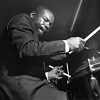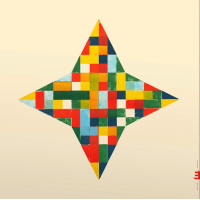Home » Jazz Articles » Album Review » Charles Mingus: The Lost Album from Ronnie Scott's
Charles Mingus: The Lost Album from Ronnie Scott's
Even though his multiple demons (all the usual human foibles but magnified by genius) were never too far from the forefront of his garrulous self, history, while it often casts shade on even our most beloved icons, has been kind to Mingus. He's recognized in the same breath as Duke Ellington, Charles Ives, and Claude Debussy. Now, just in time for a loud and rowdy celebration of his 2022 centennial (April 22) and Record Store Day (April 23) another very sweet slice of history is heard gloriously on The Lost Album from Ronnie Scott's.
Why it takes fifty years for music of this muscle and magnitude to be released is just one of the great eternal questions, but here it is so let's rejoice. Fully authorized by Jazz Workshop, Inc., and given the full Resonance Records grand treatment: interviews with Charles McPherson, Eddie Gomez, Christian McBride; anecdotes from Mary Scott, Sue Mingus, and Fran Lebowitz, as well as archival and production liner notes. But it's the music that spins the head, spikes the pulse, and whips the carpet out from under one. It's what Mingus would want.
So it's the two nights in August at the end of a successful European run and the players are in flux but wasn't flux at the crux of Mingus' most inspired moments? Nineteen year old trumpeter Jon Faddis was not only trying to hone his young brilliance, he was trying to do so through the Mingus maze. Little known pianist John Foster succeeds Jaki Byard and drummer Roy Brooks has taken over for Mingus stalwart Dannie Richmond, who left to soak in some short lived pop rock with Mark Almond Band. It begins as most great jazz moments do. Immediately. Ronnie Scott intros the sextet. Mingus rumbles a happy birthday, thanks the audience for letting their claps be recorded, and it's off to the races with the unapologetic zest and swagger of "Orange Was the Color of Her Dress, Then Silk Blues," a full half hour of stunning, multi-part alchemy. Foster proves he's up to the task, keeping up with the turns and tides precipitated by alto saxophonist Charles McPherson and his tenor counterpart, Bobby Jones.
Variation upon variation. Creation on the fly. "Ysabel's Table Dance" (one of the many glories from Tijuana Moods (RCA, 1962) knits in and out of the general creative mayhem. There's some church, some New Orleans, some breakdowns and fanfares. Faddis and Foster, with Jones on soprano sax, hold court, hand off. Mingus guides and goads. It's an unstoppable momentum that moves into a burly bass solo intro "Noddin' Ya Head Blues" a slow, low down blues that brings Foster to the vocal forefront telling his woman "I need it every morning, I need it every night" as the horns slink and slur. So expansive is the setting that Brooks gets a musical saw solo, as well he should.
Spoiler alert: From here The Lost Album from Ronnie Scott's just gets better and better. Cascading for another riotous half hour, the recently minted Mingus twister "Mind-Readers' Convention in Milan" puts one and all to the test and just can't be described with any real justice. It needs to be heard. It needs to be experienced.
Though by its very nature any jazz moment can be considered one of kind, the barely contained madcappery that ensues in this truly one-for-the-ages performance of the seismic "Fables of Faubus" is the stuff of legend. It noodles, it sprawls, it quarrels. It reaches for the London skies and returns to the stage with ether to burn. Mingus roils as Faddis blows beyond his years, the saxophones cut and weave, Foster veers from stride to barroom to bop and Brooks drives headlong into the hijinks. In a word, remarkable. Ditto The Lost Album from Ronnie Scott's.
Track Listing
CD 1
Introduction: Orange Was The Color Of Her Dress, Then Silk Blues; Noddin’ Ya Head Blues.
CD 2
Mind-Readers’ Convention In Milano (aka Number 29); Ko Ko (Theme).
CD 3
Fables of Faubus; Pops (aka When the Saints Go Marching In); The Man Who Never Sleeps; Air Mail Special.
Personnel
Charles Mingus
bass, acousticCharles McPherson
saxophone, altoBobby Jones
saxophone, tenorJon Faddis
trumpetJohn Foster
pianoRoy Brooks
drumsAdditional Instrumentation
Bobby Jones: clarinet. Roy Brooks: musical saw.
Album information
Title: The Lost Album from Ronnie Scott's | Year Released: 2022 | Record Label: Resonance Records
Tags
PREVIOUS / NEXT
Support All About Jazz
 All About Jazz has been a pillar of jazz since 1995, championing it as an art form and, more importantly, supporting the musicians who make it. Our enduring commitment has made "AAJ" one of the most culturally important websites of its kind, read by hundreds of thousands of fans, musicians and industry figures every month.
All About Jazz has been a pillar of jazz since 1995, championing it as an art form and, more importantly, supporting the musicians who make it. Our enduring commitment has made "AAJ" one of the most culturally important websites of its kind, read by hundreds of thousands of fans, musicians and industry figures every month.
























